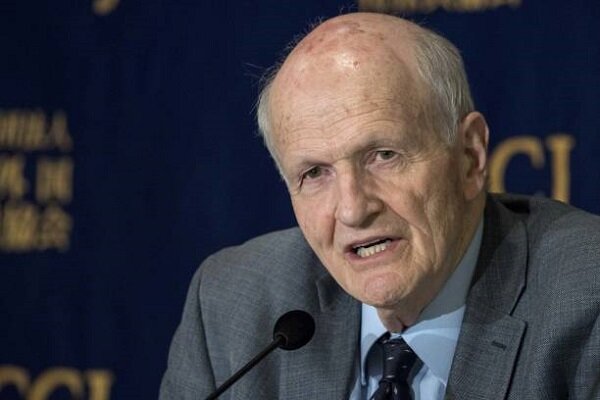All nuclear arms are dangerous, no matter Russia owns them or U.S.: nuclear physicist

TEHRAN – Expressing his worries about expansion of the Ukraine war, a nuclear physicist says all nuclear weapons are dangerous for global peace.
“All nuclear weapons are dangerous, no matter who owns them. They will destroy us if we do not eliminate them,” Frank Von Hippel tells the Tehran Times.
Many political observers are worried about the expansion of the Ukraine war as it can push nuclear powers, especially Russia and the U.S., to confront directly.
“Both the United States and the Soviet Union/Russia almost launched nuclear attacks when their early warning systems provided false information that the other country had launched nuclear missiles against them. Both countries have been led by sociopaths with authority to launch nuclear weapons – most recently Donald Trump and Vladimir Putin,” notes Hippel who is also a professor of public and international affairs emeritus with Princeton’s Program on Science & Global Security.
“The world is in a transition period away from powerful countries claiming the right to control less powerful countries in their ‘backyards’.” The risk of possible nuclear attack or using biological weapons highlights the questions about the failure of attempts to decrease mass-destructive weapons.
Here is the text of the interview with Frank von Hippel:
Q: How do you evaluate U.S. and Russia's nuclear power in comparison to one another?
A: Each has enough destructive power to destroy civilization even after suffering a first strike. Reagan and Gorbachev were right when they said a “nuclear war cannot be won and must never be fought.”
Q: Is it correct to say that Russia's nuclear arms are dangerous for global but U.S. or Britain's are safe?
A: All nuclear weapons are dangerous, no matter who owns them. They will destroy us if we do not eliminate them. Both the United States and the Soviet Union/Russia almost launched nuclear attacks when their early warning systems provided false information that the other country had launched nuclear missiles against them. Both countries have been led by sociopaths with the authority to launch nuclear weapons – most recently Donald Trump and Vladimir Putin. Britain has far fewer nuclear weapons and they are not in a launch-on-warning posture but they could destroy more than one hundred large cities.
Q: After the collapse of the Soviet Union, NATO pledged not to expand toward Russia. Don't you think the Western powers are threatening Russia's hegemony in its backyard?
A: Hopefully, the world is in a transition period away from powerful countries claiming the right to control less powerful countries in their “backyards”. The United States has had that attitude toward the entire Western Hemisphere, and we see that attitude still in U.S. sanctions on Cuba. Russia earned its paranoia historically through suffering many invasions, starting with the Mongols in the 1200s and most recently by the Germans in the 1940s. Russian leaders like Putin have therefore been obsessed with controlling Russia’s “near-abroad.” But, in this case, Putin has created the threat he feared. Ukraine refused its domination and began to establish a democracy oriented toward Europe rather than Russia. Putin saw that as a threat. His less paranoid predecessors, Gorbachev and Yeltsin, did not.
With regard to NATO expansion, I have mixed feelings. Historically, NATO was established as a defense alliance against the Soviet Union which, unlike the United States in Western Europe, refused to release its control of the East European countries that it had overrun at the end of the Second World War, including half of Germany. (Recall that the Soviet Union had to be pressured by the United States to leave northern Iran after World War II.) NATO’s expansion into East Europe after Gorbachev refused to continue to control East Europe by force was in response to those newly freed East European countries fearing that someone like Putin would come into power in Russia and attempt to subjugate them again. Whether NATO expansion helped create the paranoia in Russia that helped Putin take power is worth debating.
Q: Antonio Guterres has said the Security Council failed to prevent or end the war in Ukraine. Do you think we are reaching a phase in which world powers cannot understand each other's language?
A: Unfortunately, it appears that Putin did not hear Guterres’ plea to create humanitarian corridors through which the civilians trapped in Mariupol could escape. I think that Putin has trapped himself and all of us as well. To stay in power in Russia, he must win in Ukraine. A strongman leader becomes vulnerable if he is defeated in war. We saw that in the collapse of the Argentinean military dictatorship after it lost its war with Britain over the Falklands Islands.
Q: Do you expect a third world war or expansion of the Ukraine war?
A: I am very worried about what Putin might do if he fails to keep at least increased territory in Ukraine and fears being seen as a “loser” by another ambitious Russian would-be strongman who would like to take his place. At the same time, we must support the UN charter, which outlawed “acts of aggression” if we are not to return to a dog-eat-dog world. This puts us in a dangerous situation. Is Putin willing to destroy the world rather than lose power?
Leave a Comment